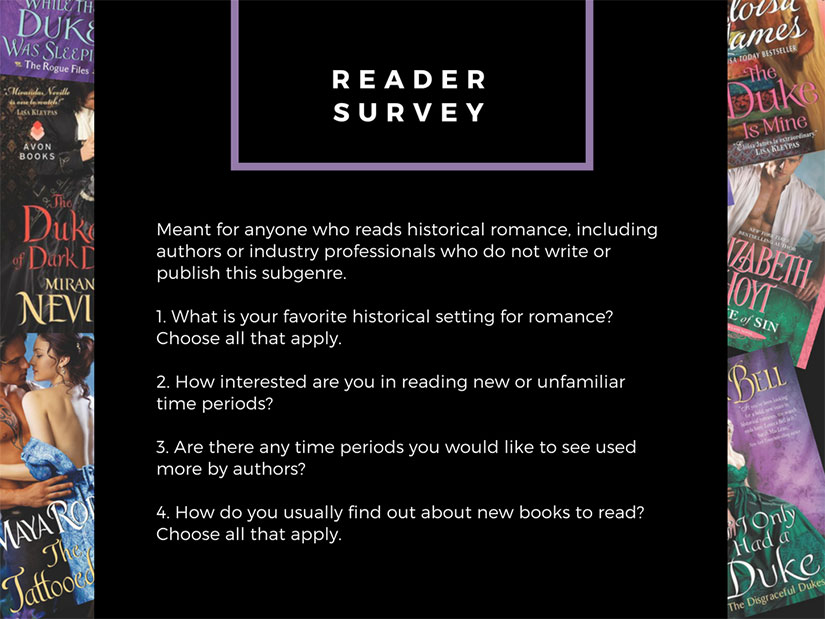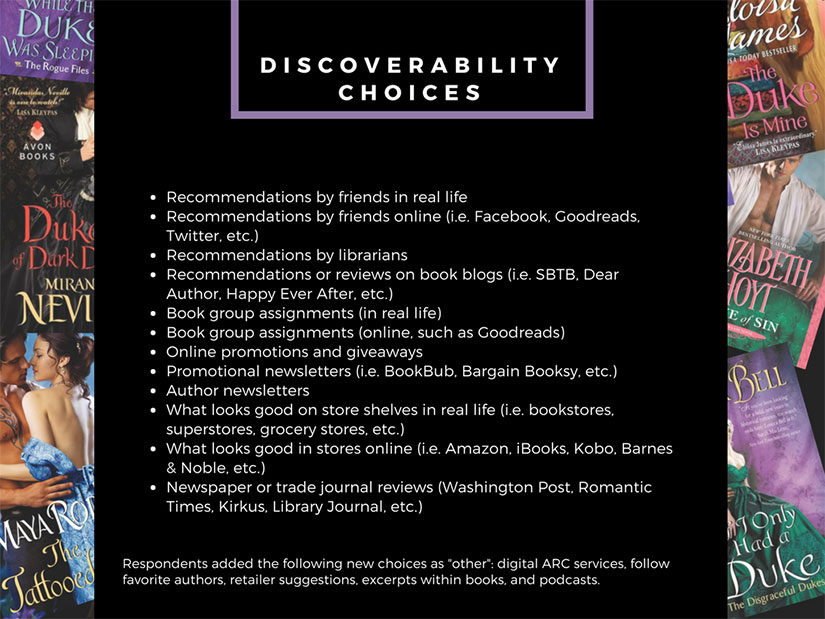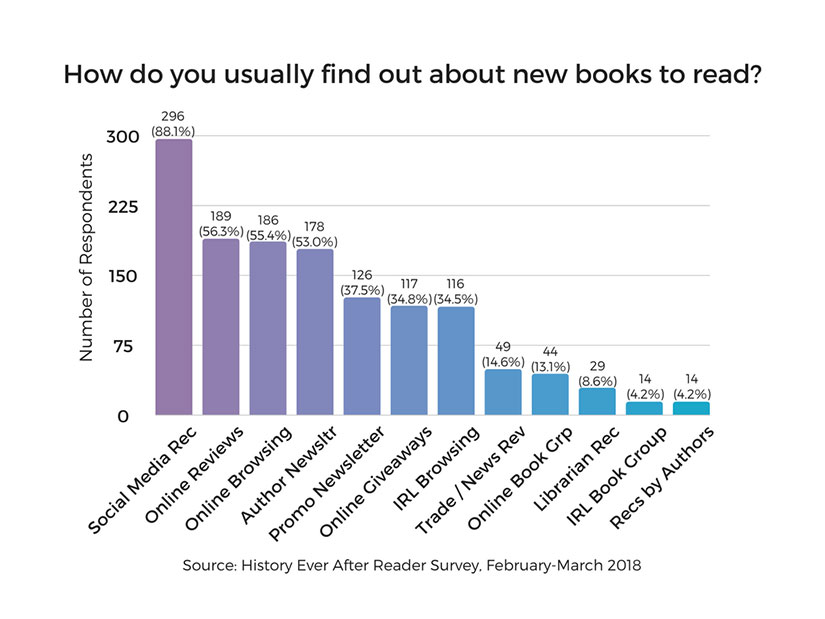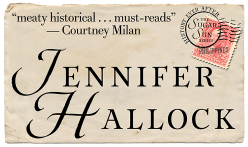(In preparation for my presentation, “History Ever After: Fabricated Historical Chronotopes in Romance Genre Fiction,” I created two surveys, one for readers of historical romance and one for those producing it. Now the results are in. Do you want to sneak a peek?
I am not going to spoil the whole presentation now, but I will show you a little bit from the reader’s survey. Here were the questions asked:

Question four is my topic of the day: discoverability. That’s the toughest nut to crack in today’s market so authors, listen up! Below are the options available to the respondents. (They also had a write-in option.)

I wish I had a drum roll for the big reveal here, but since I don’t here goes…

I know what you’re thinking: Social media recommendations won? Woot woot! I’m gonna throw promo around my favorite Facebook groups like graffiti! Well, hold on there, friend. Let me make an important disclaimer before you do. My survey link was distributed via social media, especially Facebook groups and, to a lesser extent, Twitter.
It makes sense, then, that the survey respondents would take book recommendations via the very same channel that suggested the survey, right? So let’s not overvalue that response. But what can we learn from the results?
- As you might expect, book blogs do sell books. If you can get reviewed by several of these sites, especially the big ones, terrific! (It does not matter the grade they give you, believe it or not. I have heard both Sarah Wendell and RedHeaded Girl from Smart Bitches, Trashy Books say that—according to author feedback—the books with the biggest sales boosts might be those with the lowest-scoring reviews. Keep in mind that while the reviewer might not like bear-shifter-billionaire-alpha-hole-holiday-baby-surprise books, Jane the Reader might want to devour them like, well, a bear.
- Beyond book blogs, though, almost as many people find books through random browsing online. You can pay to promote on retail sites like Amazon, and how often your ad shows up depends on how much you bid for the spot. The real gold mine, though, is when a retailer promotes your book for free, especially in search results. To do this, you need to make friends with a nasty beast: the algorithm. How? Well, being a bestseller already is good. That’s helpful, right? To sell books you need to have sold books. Great, Jen. Thanks. Okay, how about this: a connection to another bestselling novel helps, too—those coveted “also bought” features. Outside of this survey, I have been tracking bestseller lists for three months, and I have noticed that sales on Amazon are strongly affected by our next marketing tool…
- Promotional newsletters like BookBub, Bargain Booksy, and others have changed the publishing industry. Initially, BookBub was a resource targeted at independent authors, but its tremendous success (millions of subscribers) meant that bricks and mortar publishers quickly got on board. While the big New York houses do not like to discount their books too close to publication date, they do use BookBub and others for their backlists. For example, Julie Garwood’s The Wedding, first published in 1996, was discounted to $1.99 this past week, advertised on BookBub on Tuesday, and now (on Thursday) it is still number 67 in the Kindle Store. That means it is on target to sell approximately 1500 copies today, according to Dave Chesson’s Kindlepreneur calculator. Before you rush to submit to BookBub, know that they do not accept everyone’s request for promotion. And, even if they do take your book deal, a spot in their newsletter is not cheap: from $66 to $4,000, depending on your genre, market (US or international), or book sale price. Is this worth it for an indie author? Maybe, after you have enough other books in a series to sell at full price to the new readers you attract.
- Speaking of newsletters, an author’s newsletter still has cache! (Did you know that you can sign up for mine here? Just checking.) In fact, author newsletters came in above promotional newsletters in the survey, but I put the paid ones first on this list because of their success in pushing sales. (By the way, I will be writing more about my bestseller tracking results after IASPR this summer.) Just keep emailing your readers—and do recommend the books that you enjoy reading, too, because people are listening. Read on…
- Fourteen people wrote in “recommendations by other authors.” This result could be compromised by the place I solicited for responses—two of which were big author pages—but I do think it is interesting that four percent of my respondents wrote in the very same idea (and that they felt it was distinct from other social media recommendations). So endorsements work. But you need to find an author with a big enough following to matter, and this is not always easy for debut authors without the support of a good agent or large publisher.
- Giveaways are popular in this survey, too, but I have a question about those: will entrants buy your book if they lose the giveaway? Anecdotal evidence from my friends says not necessarily, but I imagine that if your goal is to create name recognition, a giveaway on a site like Goodreads could work for you. I have no data to back this up, other than the relatively strong showing on this survey.
- Even digital people have a real life. The next response people gave was browsing in bookstores, superstores, grocery stores, libraries, and (yes!) yard sales. Obviously, this distribution channel favors print books; those who publish digital-only miss out. The deck is also stacked for traditional publishers who have distribution networks that reach into Walmart, Target, Barnes and Noble, and more.
That’s all for now. I am still analyzing the results of this survey, and these are just my first thoughts. Do remember that this is a survey for historical romance, and the results may have been different for readers of contemporary, erotic, inspirational, paranormal, or other romance subgenres. I will put this survey together with my other research to examine the most popular settings, plots, and characterizations in bestselling historical romance—the chronotopes—and see how flexible the market is. More to come!
[Background photo used in header taken by Jerzy Gorecki, used with permission under the Creative Commons CC0 Universal Public Domain Dedication 1.0 license.]







